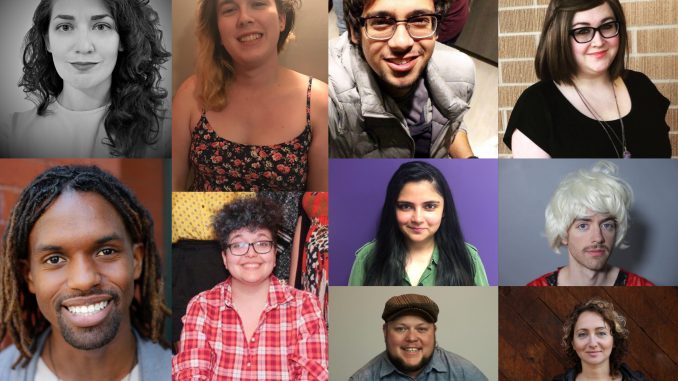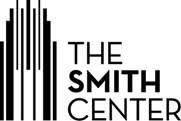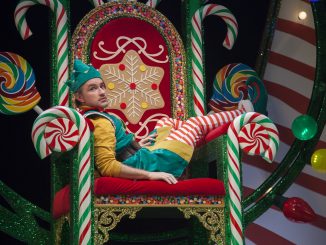
Nothing Without a Company, a Chicago theatre company dedicated to site-specific new works, will open its thirteenth season with its second annual New Play Festival, featuring new works from ten Chicago playwrights. I interviewed these ten playwrights about their work and the festival, and they had some fascinating things to say. This is part two of a two-part article. Read part one here!

Ray Goldberg
Describe your play to someone who’s never heard of it.
My play “Flop Sweat” is a fantastical take on all the arguments artists have with the little voices in our heads, and how our negative and positive thoughts about ourselves each have their pros and cons.
What drew you to Nothing Without a Company’s new play festival in particular?
I’ve been working with Nothing Without a Company since October of last year, and I love the company dearly. I was already attached to work as the production manager for this new play festival, but the reason I decided to throw my writing hat into the ring is that it seemed like the perfect opportunity to expand my horizons and workshop a brand new piece.
Which playwright(s) would you be most flattered to be compared to?
To be perfectly honest I’m new to the playwriting scene (my background is in screenwriting) and so I’m still learning who my favorite playwrights are, but Kristoffer Diaz has a fantastic blend of comedy and dramatic introspection that I’d love to achieve.
Why should someone come to the festival, in three words or less?
These plays rock.

Marianna Staroselsky
Describe your play to someone who’s never heard of it.
#RUWorthy is a satirical exploration of this reality (show) we’re in. Through a series of trials testing their worthiness of love, trust, and audience appeal, four wannabes from various walks of life compete to get to stay in a utopia you know too well: the United States of America. #RUWorthy asks: What is this (reality) show we’re in? And who gets to be a part of it?
What drew you to Nothing Without a Company’s new play festival in particular?
I love Nothing Without a Company’s sense of community, supportiveness of emerging artists, and innovation with site-specific work. I was excited by the prospect of writing a play for the Berger Park mansions specifically – they’re very interesting, historic spaces that fuel the imagination. It’s a wonderful challenge and this festival is one that is particularly open to imaginative work that connects with the space in various ways.
Which playwright(s) would you be most flattered to be compared to?
Caryl Churchill, Eugene Ionesco, Tony Kushner
Why should someone come to the festival, in three words or less?
Historic-Future-Now!

Dolores Diaz
Describe your play to someone who’s never heard of it.
In Appreciation Day, members of a local senior living facility, children of a nearby daycare, and neighborhood law enforcement are gathered together (voluntarily and involuntarily) on Police Appreciation Day. It was inspired by a puff piece in a local Chicago paper and re-imagines the meeting from the perspective of people of color.
What drew you to Nothing Without a Company’s new play festival in particular?
NWAC has been on my radar for some time. I’ve seen a few of their site-specific pieces and had friends that were involved with the company, so I was looking for ways to get involved. The New Play Festival is the perfect way to collaborate with the company and get to know associated artists.
Which playwright(s) would you be most flattered to be compared to?
John Leguizamo, Martin McDonough, Maria Irene Fornés, Conor McPherson, Will Eno, Mickle Maher, Stephen Adly Guirgis, Annie Baker, Lorraine Hansberry, Suzan-Lori Parks, Edward Albee, Arthur Miller, Rupert Reyes, Samuel Beckett, Luis Valdez, Tanya Saracho, Kirk Lynn.
Why should someone come to the festival, in three words or less?
To see underrepresented narratives
Aalisha Sheth

Describe your play to someone who’s never heard of it.
The Last Plait is about hypercritical mothers and defiant daughters, and the (dysfunctional) intimacy they share with each other.
It’s about mothers and daughters questioning myths, challenging patriarchy, making amends, and finding themselves over hair care.
What drew you to Nothing Without a Company’s new play festival in particular?
The New Play Festival was a great opportunity to tell inclusive, engaging and evocative stories within a short time frame. The short play format allows me to experiment with the storytelling in ways that really excite me. Also, the fact that the festival is happening at Berger Park is the icing on the cake, because I love that space.
Which playwright(s) would you be most flattered to be compared to?
Compared to? Umm… that’s a tough question to answer.
But I’d certainly aspire to write and make work that’s as compelling as Caryl Churchill, Rajiv Joseph, Mia Chung and Stacy Osei-Kuffour among others.
Why should someone come to the festival, in three words or less?
Because: Our Stories Matter.

B.J. Tindal
Describe your play to someone who’s never heard of it.
An emotionally sensitive straight guy is upset that his girlfriend doesn’t pay enough attention to him, so he stages a fake affair in hopes of making her jealous. He asks a friend from work to help him make it look like they had “gay sex” in her bed, but when she finally arrives…her reaction is not exactly what he was expecting.
What drew you to Nothing Without a Company’s new play festival in particular?
I just finished being in an MFA writing program with Hannah Ii-Epstein, one of NWAC’s co-founders, in the spring. Hannah was always bringing in new scenes that got me excited about site-specific work in a way that I hadn’t been before. She was always using her surroundings as imaginatively as possible. It pushed me to go through some of my old work and re-imagine them in the actual spaces that they take place in. There’s something about the intimacy of a bedroom/a bed that I think is even stronger when you feel you are actually being invited into someone else’s living space. The stakes get higher and the invasion of privacy gets messier. I’m grateful to Hannah for opening my eyes to this way of telling stories!
Which playwright(s) would you be most flattered to be compared to?
Not sure I would ever be comfortable/feel right being compared to any of my favorite playwrights haha, but I will say some of my writing heroes who are currently working are Dominique Morisseau, Kristiana Rae Colón, Ike Holter, Lydia Diamond, Dave Harris, Antoinette Nwandu, and Aziza Barnes
Why should someone come to the festival, in three words or less?
PLAYS IN (a) MANSION!



